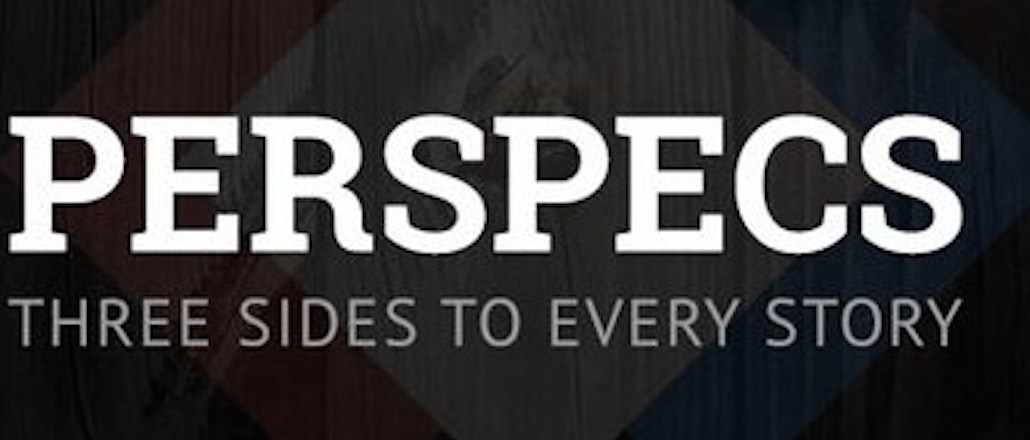‘Three sides to every story’: Behind Trinity Mirror’s news-aggregation app

When launching a mobile news app, publishers don’t usually start by aggregating other publishers’ news. But that’s what Trinity Mirror is doing with its latest app, Perspecs.
The publisher, which already has 30 tablet editions and 14 news apps (Android and iOS) across its national and regional titles — including its biggest, Daily Mirror app — is now testing audience appetite for its own curation of third-party news and opinion aggregation.
The plan is not to offer breaking-news updates but to manually curate 10 stories from other publishers, which will run as a daily edition. Three different articles, often with opposing viewpoints, will run on each story, representing the left, neutral and right-wing political perspectives on the same story.
With nary a hint of Trinity Mirror branding in sight, Perspecs shows the first 500 characters of a third-party publisher story. Then there’s a large “Read More” button that takes readers directly to the article on the publisher’s site.
For example, in Wednesday’s edition, it ran a Guardian story entitled “Terrorism publicity?” with the tagline “Does the media promote terrorism by giving the perpetrators a voice?” Users are then asked whether they think it does and, depending on which answer they give, they’re taken through to a different article which gives in-depth background information most likely to reflect their views on that topic.
“The idea is to offer news analysis beyond what’s breaking and provide different perspectives on the news,” said Trinity Mirror’s head of product, regionals, apps and email, Darren Sher. “We want to appeal to as large a group as possible, so it will be a mix of U.K. and international news covering areas like health, technology, and politics. We can provide three perspectives on things like film reviews, or new gadget launches. The point is, there are usually three sides to any story.”
The content refreshes each morning, and the publisher sends one push notification alert to encourage readers to open the app. They can also view the previous five days’ editions. If the app gets good take-up, the publisher will expand the amount of content that runs through it, and increase the push notifications, according to Sher. There are also other features the team is keen to introduce if the app does well, including more ways for users to vote on stories.
There’s currently no monetization play, though the publisher has been mulling various options for commercializing the product if it proves successful. The first is a revenue-share option similar to Apple News’: Trinity Mirror could take a cut for an ad sale the third-party publisher makes on that specific article, for example. Another option is native advertising, or in-app subscriptions, according to Sher.
“We’re looking at what other news aggregators are doing and how the likes of Apple News and Flipboard monetize on a revenue-share basis,” he said. “It’s a model we’ll consider. In-app subscriptions could work with users paying to unlock additional content. But it all depends on the size of the audience.”
Figuring out how to monetize audience shifts to mobile is a priority for all publishers, and Trinity Mirror’s audiences are scaling at a very high rate. Last December, it had 20.4 million unique users visit its site via mobile devices, 17.6 million of whom accessed the sites exclusively on mobile, according to comScore. The total digital population on desktop and mobile across the group is 25.3 million.
The publisher now has a 100-strong in-house product team, which divides into 10 10-person teams, each with a specific focus like video and mobile products. Sher emphasized the importance of getting basic new products out into market quickly, and which can be honed and evolved once it’s clear there’s enough appetite for it.
DigitasLbi mobile strategist Rafe Blandford said the app is a relatively easy and cost-effective way to experiment with a new format, and less risky than tweaking an existing product. “Even if Perspecs fails fast, the lessons learned will be applied more widely. The Trinity Mirror attention data — who reads what — will give an insight into which of their competitor’s stories performs well, and will be invaluable in future monetization efforts across all their properties,” he added.
More in Media

Digiday+ Research: Dow Jones, Business Insider and other publishers on AI-driven search
This report explores how publishers are navigating search as AI reshapes how people access information and how publishers monetize content.

In Graphic Detail: AI licensing deals, protection measures aren’t slowing web scraping
AI bots are increasingly mining publisher content, with new data showing publishers are losing the traffic battle even as demand grows.

In Graphic Detail: The scale of the challenge facing publishers, politicians eager to damage Google’s adland dominance
Last year was a blowout ad revenue year for Google, despite challenges from several quarters.







